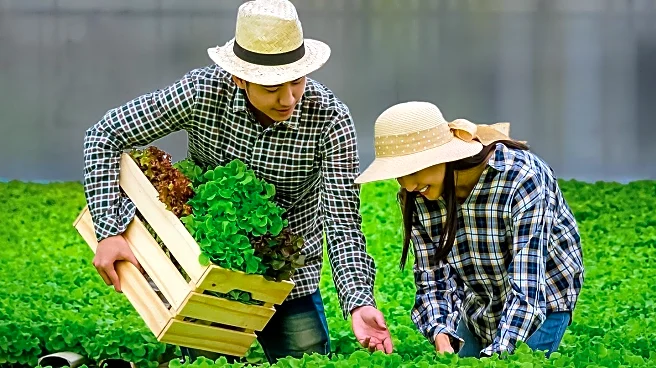What's Happening?
Dharma Realm Buddhist University is hosting a presentation on regenerative agriculture, featuring Dr. Craig Elevitch and Jamyang Dolma, co-creators of the Mama Food Forest project in Hawaii. The event aims to highlight traditional agricultural practices that enhance crop yields while fostering a harmonious relationship with nature. Dr. Elevitch, an expert in agroforestry, has worked extensively in the Pacific Islands, promoting sustainable food systems. Jamyang Dolma, known for preserving traditional culture, collaborates with Elevitch to integrate Buddhist principles into their project, focusing on reconnecting mothers and children with nature.
Why It's Important?
The presentation underscores the significance of regenerative agriculture in promoting sustainable food production and environmental stewardship. By preserving traditional wisdom, Elevitch and Dolma aim to empower communities to adopt practices that enhance biodiversity and resilience. This approach not only supports ecological balance but also addresses modern agricultural challenges such as soil degradation and resource depletion. The initiative is particularly relevant as it offers a model for sustainable development that can be replicated globally, potentially transforming agricultural practices and improving food security.
What's Next?
The Mama Food Forest project plans to continue offering educational programs to Hawaiian mothers, enabling them to create their own food forests. This initiative is expected to expand, fostering community engagement and promoting regenerative farming practices. The presentation at Dharma Realm Buddhist University may inspire further collaborations and discussions on sustainable agriculture, potentially influencing policy and educational curricula. Stakeholders, including environmental groups and policymakers, may explore ways to integrate these practices into broader sustainability efforts.
Beyond the Headlines
The project highlights the cultural and ethical dimensions of agriculture, emphasizing the importance of traditional knowledge in modern practices. By focusing on mothers and children, Elevitch and Dolma address the societal shift away from nature, advocating for a reconnection that nurtures both individuals and communities. This approach challenges conventional agricultural paradigms, offering a holistic perspective that values ecological and cultural heritage. The initiative may inspire similar projects worldwide, contributing to a global movement towards sustainable living.









